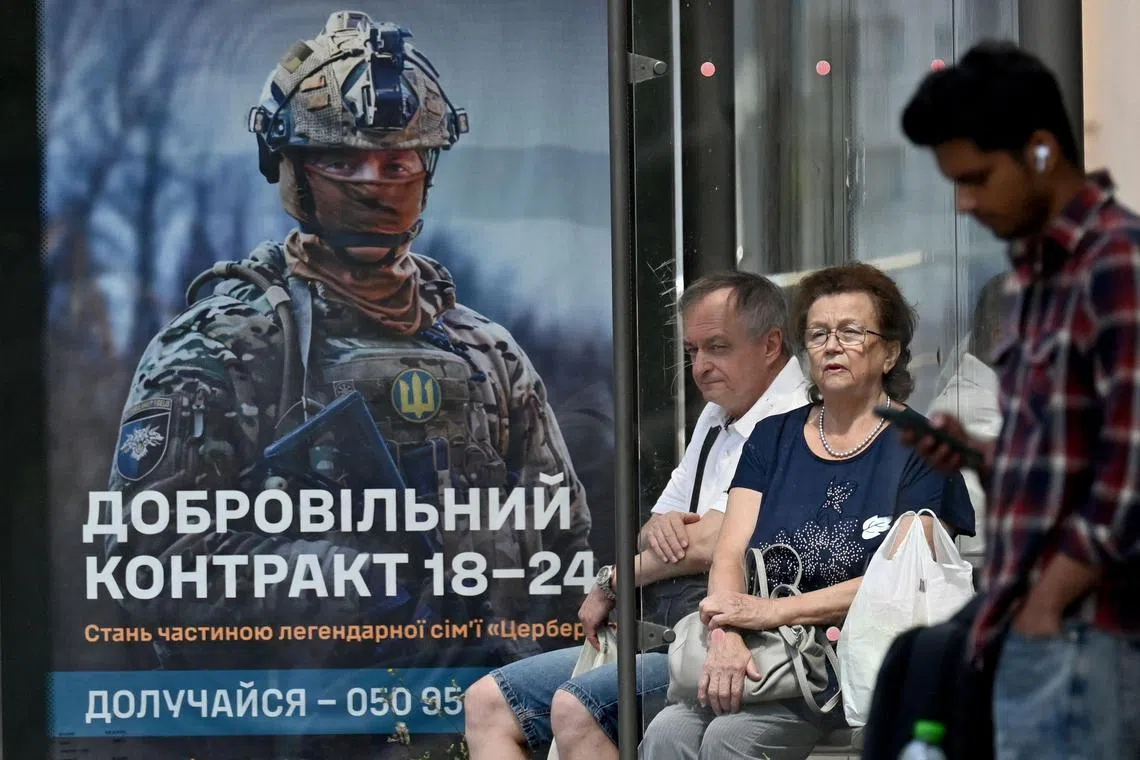Ukrainians greet planned Trump-Putin summit with deep scepticism
Sign up now: Get ST's newsletters delivered to your inbox

A recruitment poster for the Ukrainian Armed Forces at a bus stop in Kyiv.
PHOTO: AFP
- Trump suggested a summit with Putin and Zelensky to end the war, confirmed by the Kremlin, but Ukrainians are sceptical of Russia's intentions.
- Zelensky seeks a united front with European allies, prioritising a ceasefire and lasting peace, but insists on terms acceptable to Ukraine.
- Ukrainians fear being pressured into a peace deal that cedes territory to Russia, which polls show is widely rejected, causing "strategic uncertainty".
AI generated
KYIV – Ukrainians have reacted with caution and deep scepticism to the suggestion that US President Donald Trump can deliver an end to Europe’s deadliest war in generations.
A Kremlin aide, Mr Yuri Ushakov, on Aug 7 confirmed that a meeting was being planned
Mr Trump had on Aug 6 told European allies that he would follow such a meeting with a trilateral summit with Mr Putin and President Volodymyr Zelensky of Ukraine.
Such talks, he said in public comments later, could lead to “the road ending” for the conflict.
Mr Ushakov, Mr Putin’s foreign policy adviser, declined on Aug 7 to discuss the idea of a three-way summit with Mr Zelensky.
Despite the promise of talks, many Ukrainians expressed fear that the White House is again being strung along by the Kremlin.
“Of course, we shouldn’t take all this as a prelude to the end of the war,” Mr Volodymyr Fesenko, a Ukrainian political analyst, wrote in a social media post, echoing a widely held view. “On Putin’s part, this could be another insidious manoeuvre,” he added.
Mr Fesenko said that Mr Putin’s approach could range from “imitating real negotiations to trying to lure Trump into a negotiating trap in order to sell him a ‘softened’ version of peace on Russian terms, which will then be imposed on President Zelensky and Ukraine”.
The latest developments, Mr Fesenko added, were a “glimmer of a changing (and possibly deceptive) light at the end of a dangerous negotiation tunnel”.
Mr Zelensky scheduled calls with leaders across Europe on Aug 7 as he sought to present a united front with allies before any summit.
“The priorities are absolutely clear,” Mr Zelensky said in a statement, noting that Russia must agree to a ceasefire.
He also called for talks to be structured in a way that “can lead to a truly lasting peace”.
Long-term security, he added, would be possible only together with the US and Europe.
Ukrainians have been through this before.
In April, Mr Trump wrote that a peace deal was “very close” and that “the two sides should now meet, at very high levels, to ‘finish it off’”.
“Most of the major points are agreed to,” he added. “Stop the bloodshed, now.”
Instead, the war continued. Russia’s land offensive in eastern Ukraine has pushed slowly forward, while its aerial bombardments
While Ukrainians nearly universally want the conflict to end, the government in Kyiv has made it clear that it will not accept peace at any price.
Recent polling by the Kyiv International Institute of Sociology found that about three-quarters of Ukrainians reject any peace plan that calls for the ceding of territory not already captured by Russia – a central demand of the Kremlin.
While Ukraine’s government long ago accepted White House demands to sign up for a complete and immediate ceasefire,
Mr Trump offered no details about why he believed Mr Putin might be ready to change his stance. It was also not known what Mr Putin might have told the White House special envoy, Mr Steve Witkoff, at their meeting in Moscow on Aug 6
That has left Ukrainians in limbo as the war rages at the front and in cities and towns under daily bombardment.
“Strategic uncertainty is the motto of the moment,” Ms Marina Stavniychuk, a lawyer who once worked in the Office of the President of Ukraine, wrote on social media.
“A very complex international game is under way.” NYTIMES


